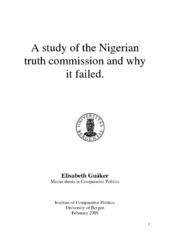A study of the Nigerian truth commission and why it failed
Master thesis
Permanent lenke
https://hdl.handle.net/1956/6215Utgivelsesdato
2009Metadata
Vis full innførselSamlinger
Sammendrag
The Nigeria truth commission the Oputa Panel was set up in 1999 to investigate and recommend the appropriate redress of human rights violations committed between 1966 and 1999. Facing several delays and dangers of shut down the Commission finally handed over its report in May 2002. The Nigerian government responded by annulling the Commission and consequently refused to implement any of its recommendations. This thesis set out to identify the factors which can explain the failure of the Nigerian truth commission. We argue that the Oputa Panel was never endowed with the sufficient resources and powers to investigate its extensive mandate nor did it enjoy the governmental support necessary for the implementation of its recommendations which included recommendations of criminal investigations into 150 human rights crimes. The outcome can be explained by the invasive role of the military in Nigerian politics. Military officers remain a coherent force in Nigerian politics. They enjoy the loyalty of the Armed Forces and remain a threat to democratic stability. By virtue of their unique positions they have access to political decision-making channels and can circumvent any efforts to hold the military accountable for the brutal and systematic human rights atrocities which were committed during the military era.
